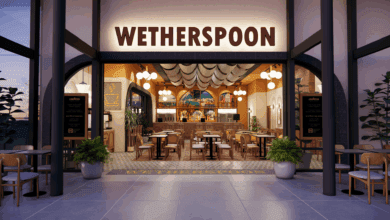The rise of the gluten free demand: how should businesses accommodate it?
It is estimated that 1 in 10 people is affected by Coeliac Disease in the UK but many more choose to follow a gluten free diet for health-related reasons. Philip Rayner, co-owner of Glebe Farm which is the only farm in the UK growing and processing gluten free oats, told Catering Today about the importance for the industry to provide options for those with food intolerances

Register to get 1 free article
Reveal the article below by registering for our email newsletter.
Want unlimited access? View Plans
Already have an account? Sign in
Where did the idea of growing and processing gluten free oats come from?
This is our home from I think about 1970 and I grew up on Glebe Farm. From 2009 we started to do gluten free oats because we wanted to start selling again things we could grow on the farm. So we were growing oats and we could make them gluten free because we make them ultra clean. And since 2009 we kind of started off the gluten free whole oat supply business chain in Europe. Many more coeliac societies grew over a period of time in Spain, Germany, Italy and they started using gluten free oats too. Innovation is really what’s driven us to develop this market, it was something that just didn’t exist before and has been a really important thing for coeliacs in the UK.
What trends have you noticed when it comes to gluten free products?
It’s definitely growing, because we still have a 10%-20% growth per year. The UK puts very strong importance on allergens safety and quality of products and foods, which is something that started in the food manufacturing industry but is now translating to the catering one as well.
What do you think are the factors behind this growth?
So when we started out, there were probably only about a quarter of percent of coeliacs. In the UK, the coeliac population is only 1% and that’s not changing. But what’s changing are the intolerances and people’s perceptions on certain foods. So now you have people who are not coeliac but might get milder symptoms, or simply are not able to digest gluten properly.
In addition, people are much more aware that changing their diets, making sure their diet suits them benefits their gut health. And oats in particular are really good for gut health, they have a lot of nutrients. So generally, I think the fact that people are making healthier food choices is what’s making gluten free products, and plant drinks, more common now.
What do you think the food manufacturing and catering businesses could do better to cater for customers that have allergies and intolerances or simply choose to not eat certain foods?
In terms of food manufacturing, that awareness of allergens has been around for 10 or 15 years. So certainly in the next 10 years they will become more and more important and use more and more clean labels. The challenges for catering are more difficult to be honest. Because for example here at Glebe Farm all our facilities are dedicated to gluten free products so we have no issue whatsoever. But when it comes to catering, and having no separate facilities, the risk of cross contamination is there.
But it’s a step that the catering industry has to make because if they do cater for allergies that means that they can serve more customers and they’re not obligated to turn people away. You might have people walking out the door because one member of their family can’t eat there so in that case you lost more than one customer.
And it doesn’t have to be just for allergies or intolerances. Nowadays people make food choices for a variety of reasons, including for climate change or if they simply don’t like the taste of something. And then of course there are more and more people who are following a vegan diet. So customer demand is changing rapidly and the catering industry needs to follow.
Is cross contamination ever avoidable if businesses don’t have dedicated facilities for allergen-free food?
The absolute gold standard in the UK, it tends to be to have dedicated facilities. And some brands will willingly choose to put a gluten free alternative across the entire range so that the majority of customers can eat it. But once again for catering it’s different and there’s always a level of risk. And if that risk becomes a complaint, or somebody gets ill, you’ve got an issue there. So you can either have specialists, or you can manage it in a sensible way if you’ve got the required knowledge to be able to do it.
So I’d say that it’s a very big challenge for hospitality but removing gluten is still a very possible thing to do without changing and good recipes are still possible.
What’s the future going to be like for gluten free products?
Medically speaking, I think the number of people getting diagnosed or choosing to follow gluten free diets for health reasons is going to double in the next 30-40 years. And this has a lot to do with migration as well, because people from countries who are not reliant on wheat might be more susceptible to gluten. So as more people come to the UK, I think we’ll find an even stronger need to cater for them.







